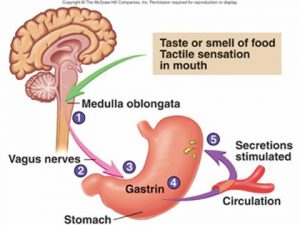Youths At Risk For Obesity Show Greater Reward Response
 In the March 23, 2011 issue of The Journal of Neuroscience, Oregon Research Institute (ORI) senior scientist Eric Stice, Ph.D. and colleagues, including Dana Small, Ph.D. from the J.B. Pierce Laboratory in New Haven Connecticut, provide possible answers to the chicken or egg dilemma of overeating. Do youths overeat just to eat or is their something in their brain activity that causes overeating.
In the March 23, 2011 issue of The Journal of Neuroscience, Oregon Research Institute (ORI) senior scientist Eric Stice, Ph.D. and colleagues, including Dana Small, Ph.D. from the J.B. Pierce Laboratory in New Haven Connecticut, provide possible answers to the chicken or egg dilemma of overeating. Do youths overeat just to eat or is their something in their brain activity that causes overeating.
Stice Study
The Stice study found that weight gain produced a dull response to the intake of palatable food (chocolate), suggesting that overeating may lead to a reduced reward from food. The Study participants were sixty thin youths. The high-risk teens were children of two obese or overweight parents. The low-risk teens had two lean parents. Adolescent children of obese versus normal-weight parents show a fourfold increase in risk for obesity.
FMRI Scan Results
“The results suggest that the initial vulnerability for overeating may be hyper-responsivity of reward circuitry to food intake. The fact that the same reward regions showed greater response to monetary reward is novel and implies that individuals at risk for obesity show greater responsivity to reward in general. These findings seem to challenge the widely accepted theory that it is a reward deficit that increases vulnerability to overeating.”
Conclusion
The FMRI scan also showed that the youths who were at a high-risk for becoming overweight or obese their brain showed hyper-responsivity of somatosentory regions to food intake, which plays a key role in sensing the fat content of food. These results suggest that individuals who are particularly sensitive to detecting high-fat foods may be at unique risk for overeating.
Source: http://www.sciencedaily.com/releases/2011/03/110322172223.htm
 Eating Disorder Self Test. Take the EAT-26 self test to see if you might have eating disorder symptoms that might require professional evaluation. All answers are confidential.
Eating Disorder Self Test. Take the EAT-26 self test to see if you might have eating disorder symptoms that might require professional evaluation. All answers are confidential.